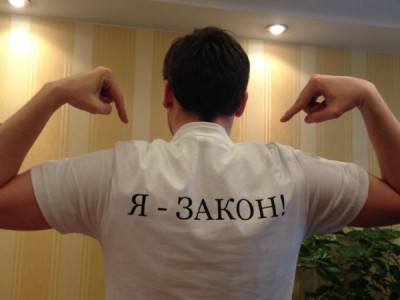
“The logic is pretty simple. Judges should not have anything to hide if they are not corrupt,” Stanislav Batryn, co-founder of the “Open Court” project, told Global Voices. If the courts claim to be transparent, the project's founders reason, then they won't mind if the proceedings are broadcast live on the Internet. “Because the hearing is open and millions of people can watch it online, judges must obey all the requirements and procedures, instead of just imitating the whole process.”
“Open Court” is a grassroots project launched by Stanislav Batryn and Oleksandr Korol, cofounders of the “Open Ukraine” human rights NGO, to combat corruption and lack of transparency in Ukrainian courts. Together with a group volunteers, they intend to attend court hearings in Kyiv, capture the proceedings on camera, stream them live online when possible, and upload the archived videos to YouTube. The activists hope that footage of especially controversial cases will go viral, and will then be picked up by the media and discussed by civil society. Once the courts start feeling the brunt of the attention and pressure from the public, they believe judges notorious for their abuse of power would have to answer for their unlawful actions.

Currently online video is the main tool for “Open Court.” Although the activists stream videos via UStream, they post the archived videos of court hearings to their YouTube channel to preserve them for posterity and further analysis. They also spread the word about the cases they are following through the project’s Facebook group and on the “Open Court” web-site.
Ukrainian laws allow anyone to capture audio and video of court proceedings without having to obtain special court permission in advance, however, this is permitted only for portable audio and video capturing devices. For this reason activists rely heavily on their smartphones and portable cameras to record the hearings.
“If the judge knows the laws, they will not protest us filming the hearing,” Oleksandr Korol says. “If the judge tries to kick us out, we will conclude that they don't know the laws. If that is the case, they can not fulfill their judicial duty, so we’ll report such a judge [to the authorities].”
The “Open Court” activists are planning to expand the project and to eventually follow cases around the country. One thing they are doubtful about in terms of the success of the project is the potential reaction (or lack thereof) of the parliament, the president, and other authorities. How willingly will they intercede and fire corrupt judges when those are exposed? This remains the main hurdle, as both Korol and Batryn say they are perfectly aware of a very strong judicial lobby in the country, one that will try to protect its status quo and the jobs of the judges who are members of the lobby. At the same time, the activists are confident that there are still honest legal servants in Ukraine who are willing to play by the rules of law. And if any of them need a little push towards transparency, “Open Court” promises to be there with a camera trained on them to provide it.
Written by Anna Poludenko-Young
· comments (0)
Donate
· Share this: twitter facebook reddit googleplus
| Original enclosures: |


Nenhum comentário:
Postar um comentário